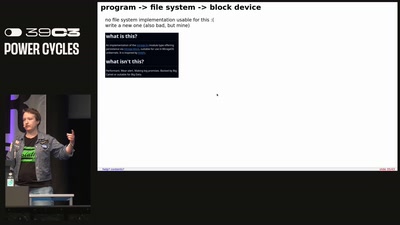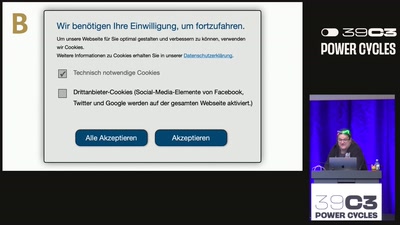Feed cleverhans-blog [copy] http://www.cleverhans.io/feed.xml has loading error: cURL error 22: The requested URL returned error: 404
Feed Security (b)log [copy] http://securityblogru.livejournal.com/data/rss has loading error: cURL error 22: The requested URL returned error: 403 Forbidden
Feed [bodyawm] Богдан [copy] https://habr.com/ru/rss/users/bodyawm/articles/?fl=ru has loading error: cURL error 22: The requested URL returned error: 404
CCC&T - Cosmic ray, the Climate Catastrophe and Trains. (39c3)

How can we predict soil moisture by measuring cosmic ray products and what have trains to do with it? Ever wondered how this Dürremonitor works, that you heared about in ther german news? These question and some more I will try to answer while I give an overview of some of the research that is done by the Helmholtz Centre for Environmental Research (UFZ). The Dürremonitor is a programme that is often mentioned in the German news when some regions experience drought. Alongside the Dürremonitor and the underlying Mesoscale Hydrological Model (MHM), there is ongoing...
How to keep Open Source open without leaving our communities open to threats (39c3)

The Four Freedoms (defined ~40 years ago) and the Four Opens (~15 years ago) for Open Source provided canonical definitions for what are the cornerstones of Open Source Software communities today. While the ethos still applies today, the cultural norms that blossomed to put it into practice are from an era with different challenges. To build a better world, we need to both keep and protect the value system of the Four Freedoms and Four Opens. To do that, we need to re-assess our risk and threat models to balance that allows beautiful minds to...
What You Hack Is What You Mean: 35 Years of Wiring Sense into Text (39c3)

Encoding isn’t just for machines — it’s how humans shape meaning. This talk traces 35 years of hacking text through the Text Encoding Initiative (TEI), a community-driven, open-source standard for describing the deep structure of texts. We’ll explore how TEI turns literature, research, and even hacker lore into machine-readable, remixable data — and how it enables minimal, sustainable self-publishing without gatekeepers. From alphabets to XML and the Hacker Bible, we’ll look at text as a living system: something we can read, write, and hack together. Computers can’t do much without encoding. They need ways to...
Battling Obsolescence – Keeping an 80s laser tag system alive (39c3)

Keeping old projects working can be an uphill battle. This talk explores how the laser tag system Q-Zar (Quasar in the UK) has been kept alive since the company behind it failed in the 90s. The challenges encountered, the lessons learnt, and how those can be applied to our own future projects to maximise the project lifetime. Looking at the effects of obsolescence in the context of a laser tag system from the 1980s Q-Zar (Quasar in the UK), what needed to happen to keep it going to enable people to continue...
I Hated All The Cross-Stitch Software So I Made My Own: My Deranged Outsider Software Suite For Making Deranged Outsider Art (39c3)

I wanted to design beautiful header diagrams and ASCII tables suitable for stitching on throw pillows, but found existing tools for cross-stitch design to be all wrong. I made my own set of command-line tools for building this chunky, pixelated visual art. If you've never seen a cross-stitch sampler that had bitrot, this talk will fix it. Designing cross-stitch patterns, I got frustrated with all the programs which expected me to click around a canvas setting individual pixels. I wanted a cross-stitch design software suite that I could drive with a Makefile, which could give...
CUII: Wie Konzerne heimlich Webseiten in Deutschland sperren (39c3)

Stellt euch vor, eine private Organisation aus milliardenschweren Konzernen entscheidet, welche Webseiten ihr nicht besuchen dürft - ohne Richter, ohne öffentliche Kontrolle oder Transparenz. Genau das macht die CUII in Deutschland seit Jahren. In Deutschland entscheidet eine private Organisation aus Internetanbietern und großen Unterhaltungskonzernen, welche Webseiten für den Großteil der Bevölkerung nicht mehr erreichbar sind. Die selbsternannte "Clearingstelle Urheberrecht im Internet" sperrt ohne richterliche Beschlüsse den Zugriff auf Hunderte von Domains. Wir haben daraufhin cuiiliste.de ins Leben gerufen, um die geheim gehaltene Liste von Domains zu veröffentlichen und so mehr Transparenz in die heimliche Zensur...
Die große Datenschutz-, Datenpannen- und DS-GVO-Show (39c3)

Datenschutz darf auch Spaß machen, und alle können dabei etwas lernen, egal ob Einsteiger oder Profi-Hacker: Bei dem Datenschutz- und Datenpannen-Quiz kämpfen vier Kandidat:innen aus dem Publikum zusammen mit dem Publikum um den Sieg. Nicht nur Wissen rund um IT-Sicherheit und Datenschutz sondern auch eine schnelle Reaktion und das nötige Quäntchen Glück entscheiden über Sieg und Niederlage. Die Unterhaltsame Datenschutz-Quiz-Show mit Bildungsauftrag! Datenschutz wird oftmals als lästige Pflicht wahrgenommen – aber was will und macht Datenschutz, für was ist er sinnvoll und was ist zu beachten? In welche Stolperfallen können auch Nerds hineinfallen? **Die Datenschutz-...
“End Of 10”: How the FOSS Community is Combatting Software-Driven Resource and Energy Consumption (39c3)

The end of free support for Windows 10 was 14 October 2025. Well, sort of. Microsoft moved the date to 2026, one more year the FOSS community can introduce users to sustainable software. 14 October is also KDE's birthday, International E-Waste Day, with International Repair Day following on 18 October. The irony is deep, but what is not ironic is that millions of functioning computers will end up becoming security risks or discarded as e-waste. This means manufacturing and transporting new ones, the biggest waste of all: hardware production accounts for over 75% of...
Asahi Linux - Porting Linux to Apple Silicon (39c3)

In this talk, you will learn how Apple Silicon hardware differs from regular laptops or desktops. We'll cover how we reverse engineered the hardware without staring at disassembly but by using a thin hypervisor that traces all MMIO access and then wrote Linux drivers. We'll also talk about how upstreaming to the Linux kernel works and how we've significantly decreased our downstream patches in the past year. As an example, we will use support for the Type-C ports and go into details why these are so complex and required changes across multi subsystems. In the end, we'll briefly...
Who runs the www? WSIS+20 and the future of Internet governance (39c3)

Abbreviations such as WSIS+20, IGF, IETF, DIEM, ICANN, PDP, ITU or W3C regularly appear in discussions about the Internet, yet often remain vague. This talk provides an update on the current state of Internet governance and explains why decisions made in United Nations processes have direct implications for technical standards, digital infrastructure, and power asymmetries. The starting point is the UN’s WSIS+20 review process, which negotiated the future of the Internet Governance Forum and the roles of stakeholders within it. Against this backdrop, the talk traces the origins of the so-called multistakeholder approach and examines...